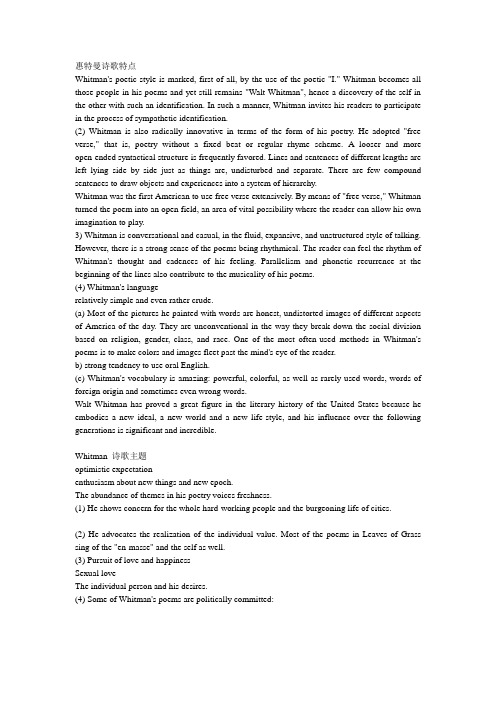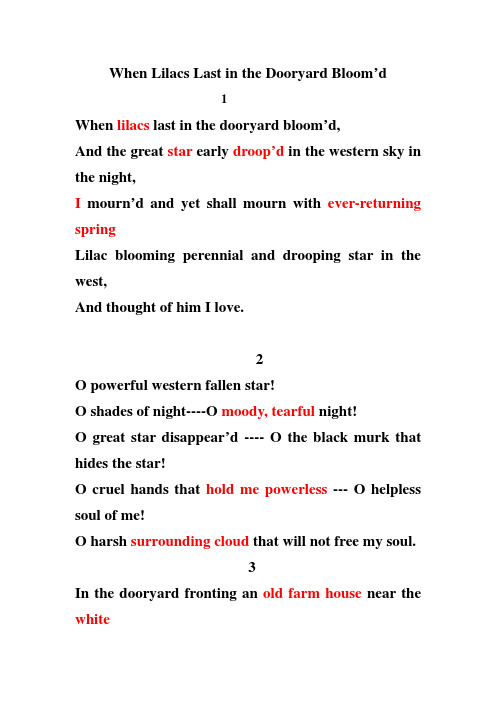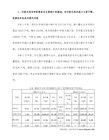Whitman and poem
- 格式:ppt
- 大小:1008.00 KB
- 文档页数:23

惠特曼诗歌特点Whitman's poetic style is marked, first of all, by the use of the poetic "I." Whitman becomes all those people in his poems and yet still remains "Walt Whitman", hence a discovery of the self in the other with such an identification. In such a manner, Whitman invites his readers to participate in the process of sympathetic identification.(2) Whitman is also radically innovative in terms of the form of his poetry. He adopted "free verse," that is, poetry without a fixed beat or regular rhyme scheme. A looser and more open-ended syntactical structure is frequently favored. Lines and sentences of different lengths are left lying side by side just as things are, undisturbed and separate. There are few compound sentences to draw objects and experiences into a system of hierarchy.Whitman was the first American to use free verse extensively. By means of "free verse," Whitman turned the poem into an open field, an area of vital possibility where the reader can allow his own imagination to play.3) Whitman is conversational and casual, in the fluid, expansive, and unstructured style of talking. However, there is a strong sense of the poems being rhythmical. The reader can feel the rhythm of Whitman's thought and cadences of his feeling. Parallelism and phonetic recurrence at the beginning of the lines also contribute to the musicality of his poems.(4) Whitman's languagerelatively simple and even rather crude.(a) Most of the pictures he painted with words are honest, undistorted images of different aspects of America of the day. They are unconventional in the way they break down the social division based on religion, gender, class, and race. One of the most often-used methods in Whitman's poems is to make colors and images fleet past the mind's eye of the reader.b) strong tendency to use oral English.(c) Whitman's vocabulary is amazing: powerful, colorful, as well as rarely-used words, words of foreign origin and sometimes even wrong words.Walt Whitman has proved a great figure in the literary history of the United States because he embodies a new ideal, a new world and a new life-style, and his influence over the following generations is significant and incredible.Whitman 诗歌主题optimistic expectationenthusiasm about new things and new epoch.The abundance of themes in his poetry voices freshness.(1) He shows concern for the whole hard-working people and the burgeoning life of cities.(2) He advocates the realization of the individual value. Most of the poems in Leaves of Grass sing of the "en-masse" and the self as well.(3) Pursuit of love and happinessSexual loveThe individual person and his desires.(4) Some of Whitman's poems are politically committed:Leaves of grassthe title: where there is earth, where there is water, there is grass. Grass, is an image of the poet himself, a symbol of the then rising American nation and an embodiment of his ideals about democracy and freedom.openness, freedom, individualism (the belief that the rights and freedom of individual people are most important) are all that concerned him.attacks the slavery system and racial discrimination.extols nature, democracy, labor and creation ,sings of man's dignity and equality, and of the brightest future of mankind .Most of the poems sing of the "en-masse" and the self as well.。

When Lilacs Last in the Dooryard Bloom’d1When lilacs last in the dooryard bloom’d,And the great star early droop’d in the western sky in the night,I mourn’d and yet shall mourn with ever-returning springLilac blooming perennial and drooping star in the west,And thought of him I love.2O powerful western fallen star!O shades of night----O moody, tearful night!O great star disappear’d ---- O the black murk that hides the star!O cruel hands that hold me powerless--- O helpless soul of me!O harsh surrounding cloud that will not free my soul.3In the dooryard fronting an old farm house near the whiteWash’d palings,Stands the lilac-bush tall-growing with heartshaped leaves of rich green,With many a pointed blossom rising delicate, with the per-fume strong I love.With every leaf a miracle- and from this bush in the door-yard.With delicate-color’d blossoms and heart-shaped leaves of Rich green,A sprig with its flower I break.4.In the swamp in secluded recesses,A sky and hidden bird is warbling a song.Solitary the thrush.The hermit withdrawn to himself, avoiding the settlements.Sings by himself a song.Song of the bleeding throat.Death’s outlet song of life, (for well dear brother I know,If thou waste not granted to sing thou would’s surely die. )5.Over the breast of the spring, the land, amid cities. Amid lanes and through old woods, where lately the violetsPeep’d from the ground, spotting the gray debris,Amid the grass in the fields each side of the lanes, passingThe endless grass.Passing the yellow-spear’d wheat, every grain from itsShroud in the dark-brown fields uprising, Passing the apple-tree blows of white and pink in theOrchards,Carrying a corpse to where it shall rest in the grave, Night and day journeys a coffin.6Coffin that passed through lanes and streets, Through day and night with the great cloud darkening theLand.With the pomp of the inloop’d flags with the cities draped in Black,With the show of the States themselves as of crape-veil’dWomen standing,With processions long and winding and the flambeaus of the night,With the countless torches lit, with the silent sea of famesAnd the unbarred heads,With dirges through the night, with the thousand voices ris-ing strong and solemn.With all the mournful voices of the dirges pour’d around theCoffin,The dim-lit churches and the shuddering organs ---- where amid these you journey,With the tolling tolling bells’perpetual clang,Her, coffin that slowly passes,I give you my sprig of lilac.7(Not for you, for one alone,Blossoms and branches green to coffins all I bring, For fresh as the morning, thus would I chant a song for youO sane and sacred death.All over bouquets of roses,O death, I cover you over with roses and early lilacs. But mostly and now the lilac that blooms first, Copious I break I break the sprigs from the bushes, With loaded arms I come, pouring for you,For you and the coffins all of you O death.Song of MyselfI celebrate myself, and sing myself,And what I assume you shall assume,For every atom belonging to me as good belongs to you.I loaf and invite my soul,I lean and lo far my ease observing a spear of summer grass.My tongue, every atom of my blood, form’d from this soil, this air,Born here of parents born here from parents the same, and theirParents the same,I, now thirty-seven years old in perfect health begin, Hoping to cease not till death.Creeds and schools in abeyance,Retiring back a white sufficed at what they are, but never forgotten,I harbor for good or bad, I permit to speak at every hazard,Natur without check with ori ginal energy.。

惠特曼诗歌引言惠特曼(Walt Whitman),美国19世纪著名的诗人,被誉为美国诗歌的先驱和奠基人。
他的诗歌以自由、个人主义和精神自由为特点,深受广大读者的喜爱和推崇。
本文将全面、详细、完整地探讨惠特曼的诗歌,包括他的风格特点、主题内容以及对后世的影响等方面。
惠特曼的创作背景惠特曼的生平•惠特曼生于1819年,死于1892年,是美国文学史上的重要人物。
•他从小就对诗歌和文学有着浓厚的兴趣,并在成年后开始专职从事写作。
•惠特曼的创作生涯可分为几个阶段,每个阶段都有独特的风格和特点。
惠特曼的文学理念•惠特曼主张诗歌应该紧密联系人类生活,反映时代和社会的变迁。
•他强调个人主义和自由精神,认为每个人都是独特而有价值的。
•惠特曼的诗歌追求真实、自然和直接的表达,摒弃了传统的格律和形式约束。
惠特曼的诗歌风格自由诗形式•惠特曼的诗歌没有固定的格律和韵律,他自由地运用语言和形式。
•他经常使用自由诗(free verse)的形式,使诗歌更加生动和自然。
大胆而豪放的写作手法•惠特曼在诗歌中使用大量的修辞手法和意象,突出了情感和意义。
•他的诗歌充满节奏感,让读者感受到一种强烈的表达力和冲击力。
动人而深邃的主题•惠特曼的诗歌主题广泛,涉及自然、人类、社会和宇宙等各个领域。
•他关注人类的苦难和痛苦,也表达了对美好生活的向往和追求。
惠特曼的主要作品介绍《草叶集》•《草叶集》(Leaves of Grass)是惠特曼最著名的诗集,也是他一生中最重要的作品。
•该诗集于1855年首次出版,后经过多次修订和扩充。
•《草叶集》以自然、个人主义和宇宙为主题,展现了惠特曼独特的诗歌风格和创作思想。
《横放音乐》•《横放音乐》(Crossing Brooklyn Ferry)是惠特曼的另一部重要诗作。
•这首诗以布鲁克林渡轮为背景,描述了城市和人类的变迁。
•《横放音乐》通过时空的跨越,表达了人类之间的共通性和联系。
惠特曼对后世的影响启发了现代诗歌的发展•惠特曼的自由诗形式和大胆写作手法对后来的诗人产生了很大的影响。


惠特曼的诗歌英文作文英文:Walt Whitman, one of the most influential poets in American literature, is known for his unique style and themes in his poetry. His works often celebrate the beauty of nature, the value of individualism, and the importance of democracy. Whitman's poetry is characterized by free verse, which is a form of poetry that does not follow a specific rhyme or meter. This allows for a more natural and conversational tone in his writing.One of Whitman's most famous works is "Song of Myself," which is a long and complex poem that explores themes of identity, spirituality, and the interconnectedness of all things. In this poem, Whitman uses vivid imagery and unconventional language to convey his ideas. For example, he often uses metaphors and similes to describe the world around him, such as when he describes himself as "a vast similitude interlocks all" (section 1).Another notable aspect of Whitman's poetry is his use of repetition and lists. He often repeats phrases or words to emphasize their importance and create a sense of rhythm in his writing. For example, in "Song of Myself," he repeats the phrase "I celebrate myself" several times throughout the poem (sections 1, 20, and 52). He also uses lists to create a sense of abundance and inclusivity. In section 6 of the same poem, he lists a variety of people and professions, stating that "the butcher-boy puts off his killing-clothes" and "the young fellow drives the express-wagon."Overall, Whitman's poetry is a celebration of life and humanity. His unique style and themes continue to influence poets and writers today.中文:沃尔特·惠特曼是美国文学中最具影响力的诗人之一,以其独特的风格和主题而闻名。

惠特曼最经典的十首诗原文介绍惠特曼(Walt Whitman)是19世纪美国最重要的诗人之一,他的诗作开创了自由诗的先河,对于美国诗歌的发展产生了深远的影响。
本文将探讨惠特曼最经典的十首诗的原文,并对其含义和艺术特点进行分析。
诗一:《草叶集》 (Leaves of Grass)我庆祝我的肉体,并庆祝我的灵魂,我骄傲自己,对不世主义赞扬我的钟声。
我向上帝行礼,谦卑而庄重,我向大自然倾斜,以及人类的圣洁。
此诗是惠特曼的代表作之一,它以自由主义的口吻庆祝人的肉体和灵魂,颂扬人类的尊严和神性。
惠特曼通过对人类和自然的讴歌,表达了他对人类生命和宇宙的崇敬之情。
诗二:《过去世代的混合着当前的》 (A Song of Occupations)过去几代的生活,与当时世界中的生活混合在一起,并与现在的生活相连。
在无数辛勤劳动的人当中,我看到了他们的勤劳和成就。
他们为生存而努力,在现实的苦难之中耕耘。
此诗以名句“生活的意义在于工作和奉献”为主题,探讨了劳动的意义和价值。
惠特曼关注普通劳动者的生活,表达了对他们劳动的赞扬和尊重。
他试图探寻劳动的正面作用,强调劳动的同时也是一种创造和实现自我的过程。
诗三:《我是幸福的》 (I Sing the Body Electric)我歌唱人体的电流,我颂扬人类的形体。
我看到每一个人的美丽,我赞美每一步的活力。
无论男性还是女性,无论老年还是青年,我认为他们都是完美的。
这首诗以个体的身体和生命为中心,通过对人体的赞美,探讨了人性的多样性和美。
惠特曼认为人体是神圣而完美的,无论是外貌还是活力。
他以积极的态度表达了对人体和人性的赞美,追求身体的自由和和谐。
诗四:《欢呼之歌》 (Song of Myself)我庆祝自己的个体,我庆祝自由和多样性。
我看到世界中的每一个人,我与他们共鸣。
我是世界的一部分,我与自然相互交融。
我是无穷无尽的,我是每一个人。
《欢呼之歌》是惠特曼最长也是最复杂的一首诗,通过对自我和个体的探索,表达了对自由和多样性的追求。
惠特曼十首最出名的诗英文
华尔特·惠特曼(Walt Whitman)是美国著名的诗人,他的作
品深受广大读者喜爱。
以下是惠特曼的十首最出名的诗的英文名称:
1. "Song of Myself"(《我自己之歌》)。
2. "O Captain! My Captain!"(《啊,船长!我的船长!》)。
3. "When Lilacs Last in the Dooryard Bloom'd"(《当紫丁
香最后在门前开放时》)。
4. "I Sing the Body Electric"(《我歌颂电的身体》)。
5. "A Noiseless Patient Spider"(《一只无声的耐心蜘蛛》)。
6. "Out of the Cradle Endlessly Rocking"(《无尽摇篮》)。
7. "Crossing Brooklyn Ferry"(《穿越布鲁克林渡船》)。
8. "To a Locomotive in Winter"(《给一辆冬天的火车头》)。
9. "A Sight in Camp in the Daybreak Gray and Dim"(《黎明灰暗时的营地景象》)。
10. "I Hear America Singing"(《我听到美国在歌唱》)。
这些诗代表了惠特曼的创作风格和主题,包含了对自然、人类、社会和美国的独特见解和赞美。
惠特曼简介英文沃尔特·惠特曼,他是美国著名诗人,人文主义者,下面是店铺为你整理的惠特曼简介英文,希望对你有用!沃尔特·惠特曼简介Walt Whitman (Walt Whitman, May 31, 1819 - March 26, 1892) was born in Long Island, New York, a famous American poet, humanist, who created the free body of poetry (Free Verse ), Its representative works are poems "grass leaves set".沃尔特·惠特曼人物经历He ranked second in nine brothers and sisters. In 1823, the Whitman family moved to Brooklyn, New York. Whitman only took six years to learn, and then began to do printing apprentice. Whitman is basically self-taught, he particularly likes to read Homer, Dante and Shakespeare's works.After two years of apprenticeship, Whitman moved to New York City and began working at different printers. In 1835, he returned to Long Island, where he taught in a rural school. Between 1838 and 1839, he had a newspaper called "The Long Island" in his hometown. He had been teaching until 1841, after which he returned to New York and became a journalist. He also served as a freelance writer in some mainstream magazines, or published political speeches.Whitman's political speech aroused the attention of the Tanzanian Association, who made him a editor of some newspapers, but did not have a long job. During his two years as an influential newspaper "The Brooklyn Eagle", the split within the Democrats made it possible to support the Free Land Party that he left the job. After he failed to try to run newspapers for free land, he began to float in different jobs. Between 1841 and1859, he edited a newspaper in New Orleans, two newspapers in New York and four newspapers in Long Island. In New Orleans, he witnessed the slaves auction - something that was common at the time. At this time, Whitman began to focus on writing poetry.The 1940s were the first harvest of Whitman's long-term work: in 1841 he published short stories, and a year later he published the novel "Franklin Evans" in New York. The first edition of the leaf set was published by himself at the time of his publication in 1855 and his father's death. But his collection consists of 12 long untitled poems. A year later, in the second edition of the grass leaves, together with Emerson's congratulatory letter published together. The second edition has 20 poems. Emerson has been looking forward to a new American poet, "Now I am in the" grass set "to find.After the American Civil War, Whitman was in the Ministry of the Interior as a clerk, but when the then Minister of the Interior Minister James Harlan discovered that he was "annoying" the author of the "Grass Leaf Set", he dismissed Whitman The To the seventh edition of 1881, due to rising popularity, this version of poetry to be popular. The income from the collection makes Whitman buy a house in Camden, New York.Whitman died on March 26, 1892, and was buried in Harleigh, under his own tombstone.沃尔特·惠特曼生平简介BornPoet. May 31, 1819 was born in Long Island. The father was farming, and the poor moved to Brooklyn, working as a carpenter and building a house. He was interested in the imagination of the socialist thinker and the composer of the democratic thinker,Paine. Whitman studied in public schools, served as rural teachers; childhood also had a messenger, learned typography. Later in the newspaper work, has become editor. He likes to wander, meditate, and enjoy the beauty of nature; but he prefers the city and the streets, like opera, dance, speech, like reading Homer, Greek tragedy and Dante, Shakespeare's works. From February 1846 to January 1848, he was editor of the "Brooklyn Eagle". In 1848 went to New Orleans to edit the newspaper and soon returned to Brooklyn. After five or six years, he helped the old father to build a house, operating a small bookstore, a small printing factory, free to loose, free to wander; and teenager, enjoy and boatman, navigator, coachman, mechanic, fisherman , Handyman, etc. make friends.Grass set1855 "grass leaves set" the first version of the advent of a total of 12 poems, and finally out of the 9th edition of a total of 383 poems. One of the longest one, that is later known as the "song of their own" that poem. A total of 1336 lines. The content of this poem almost includes the author's main thought of his life, is one of the most important poems of the author. The poem has repeatedly mentioned the grass leaves: grass leaves symbolize all ordinary, ordinary things and ordinary ordinary people. This epic poetry is universally cold, and only Emerson wrote a warm letter to the poet. Whitman received great encouragement from this letter."Grass set" is the most important work of Whitman poetry, named after the concentration of such a poem: "Where there is soil, where there is water, where the long grass." Poems in the poems like the United States The earth's grass, vibrant and exudes attractive aroma. They are world famous masterpiece,created a new era of American national poetry. The author has bold innovation in the form of poetry, created the "free body" of the poetic form, breaking the traditional poetry of the law, to break the sentence as the basis of rhythm, the rhythm of free and unrestrained, Wang Yang unrestrained, Shu volume freely, with blew of momentum and no Not the capacity of the package.1856, the second edition of "grass leaves set" published a total of 32 poems. "All the way through the Brooklyn ferry" is one of the poet's best works. In addition, "the song", "song of the road" is also famous.In 1859, "Saturday Weekly" published on the Christmas number of Whitman's excellent lyrics "from the never-ending swing in the cradle", this is a love and death of the carol. The next year should be a publication of Boston, please print the "grass leaves set" version 3, this poem is the first "official publication". There are 124 new poems, including "from the never-ending swing cradle" and three groups were named "song of democracy", "Adam's descendants", "reed" poetry.War eraDuring the Civil War, Whitman, as a firm democratic fighter, showed his deep humanitarian character.When the war intensified, he took the initiative to Washington to serve as a nurse, all day care and injury of the soldiers, resulting in serious damage to health. His life is very hard, by copying the date, the money saved in the sick and wounded. He served as a nurse for nearly two years, approaching about 100,000 soldiers, and many later kept in touch with him.Postwar lifeAfter the war, Whitman was appointed as a small staff member of the Indian Affairs Office of the Ministry of the Interior.Soon the minister found that he was the author of the "Grass Leaf Set" and dismissed him; he later served in the office of the Minister of Justice for eight years. As a result of the exercise in the civil war, increased experience, political thought has also been improved, his creation has entered a new stage. In 1865, Whitman in New York at their own expense printed his poems in the late civil war "桴 drum set", which received a total of 53 new poems. A few months later he published a sequel, including the memorial Lincoln's famous "recently lilac in the courtyard when the open."。